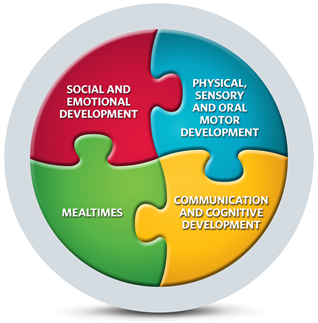During the first few weeks to months of
life, feeding gradually changes from a reflexive to a learnt behaviour. Typical
feeding development refers to a pattern and progression of feeding skills and
behaviours that is accepted as normal for the age and developmental stage of a
child. An understanding of typical feeding development is
important to be able to identify and manage feeding difficulties.
The content of this webpage has been
revised into an eLearning Module intended for use by health professionals in
Australia working with young children and their families e.g. Junior medical
staff, maternal and child health nurses, nursing students, allied health
students.
The eLearning Module is designed to explain the features of typical feeding development at different
ages and stages of early childhood. It explores the different domains of
feeding development and the complex interplay between these components:
- Medical
- Nutrition
- Feeding Skills (physical, oral
motor, cognitive, sensory and motor, psychosocial)
Both child and caregiver have important
roles and division of responsibilities in supporting feeding development.
To access the eLearning Module, click
here
A complementary eLearning Module on
Feeding difficulties is currently in development.
